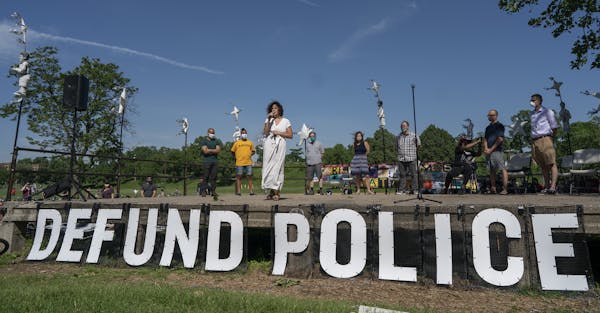Protesters in Minneapolis and across the country have found a new rallying cry: Abolish the police. And they're determined to make the city where George Floyd died a national example of radical change.
They may differ on what it means to dismantle or defund the police. But the idea has gained momentum across the country, with activists asking people to redefine public safety without armed, uniformed officers of the law.
Black Visions Collective and Reclaim the Block, advocacy organizations that have pushed to defund the Minneapolis Police Department in recent years, have now captured the attention of the city's leaders and its residents.
Kandace Montgomery, executive director of Black Visions, said the process to create something in its place begins now.
"So much of our existence has been the lies fed to us that police keep us safe, and no other alternative has really been presented," Montgomery said Monday. "What happens here in Minneapolis is going to shape the rest of the country and, I believe, the world, so we want to get it right."
This week, movement leaders have forced elected officials to take a public stand. On Saturday, Minneapolis Mayor Jacob Frey was heckled and sent away by protesters after he told them he did not support a full abolishment of the police department.
The next day, in front of a massive crowd at Powderhorn Park, a majority of City Council members stood on a stage and said they would "begin the process of ending the Minneapolis Police Department."
But doing so means more than just creating a "police in T-shirts" model, Montgomery said. It means investing in other facets of society that lead to a safe and healthy population, such as education, housing and health care.
It also means building a different structure to respond to danger that is "culturally appropriate and competent," she said. Instead of officers responding to calls of domestic assault, substance abuse or mental-health issues, they would be handled by professionals in those fields.
And while a majority of council members made a commitment to end the department, Montgomery acknowledged there needs to be education on the history of the police department — and on the disproportionate violence enacted by police against black people — to sway those who support it.
"We offer an opportunity for those individual officers as well as the institutions to be in a real process of truth and reconciliation," she said. "It's clear that not everybody is going to come with us."
Black Visions was formed in 2017 in part by people who helped establish the local chapter of Black Lives Matter, Montgomery said. After defining the collective's message, the group held a protest in front of Frey's home in 2018 asking him to divest from the police department.
Their push for police divestment continued and strengthened when they joined forces with Reclaim the Block. Their campaign in part influenced the city to create its Office of Violence Prevention within the city's Health Department, Montgomery said.
After a wave of violent crime in downtown Minneapolis last year, a survey showed a majority of Minneapolis residents supported Police Chief Medaria Arradondo's request for hundreds more cops in the coming years. The City Council voted to increase funding of the Minneapolis Police Department in last year's budget from $184.9 million to $193.3 million.
But Floyd's killing, and the resulting violent clashes between police and protesters around the nation, convinced many city leaders to listen to the defund police movement.
Council members on the stage Sunday said they would now begin to tackle dismantling the police department through budget negotiations.
Those pushing for the end of the police department said they believe it cannot be patched through reforms.
"We have had citizen review boards, body cameras and a black chief," sMiski Noor, an organizer with Black Visions, said at Sunday's rally at Powderhorn Park. "But we are still here, watching black people get murdered and tear gassed in our streets."
Noor continued: "We are here to rebuild our city on a different foundation. A foundation of real safety, protection for black people, for native people, for immigrants, for disabled folks, for queer and trans people."
The previous day, thousands marched in northeast Minneapolis toward Frey's home, demanding the defunding of the Minneapolis Police Department.
Huda Yusuf, who was at the protest with her 12-year-old son Jamal Farah, said that while she supported defunding the police, she did not know if it was realistic.
"You know when an executive comes into a corporation and then cleans house and then hires people? You need to clean house," she said. "To me, defunding the police really means that the community is looking at other options."
Farah agreed and had his own solutions, including changing officer training and requiring officers to live in the city they serve.
"People say that there's some good cops and some bad cops," he said. "But the good cops are in a bad corporation. They should change the police or just abolish the police, in my opinion."
Another protester, Maisah Outlaw, said the police department is beyond reform, citing how officers voted in Bob Kroll to become president of the Police Officers Federation of Minneapolis.
She said she'd rather see money go toward experts who treat mental health and substance abuse.
"This isn't the first time an institution that is rooted in racism has been abolished. It's not impossible," she said. "We don't need to scare people and beat people into submission."
Miguel Otárola • 612-673-4753
Newspaper boxes repurposed as 'Save a Life' naloxone dispensaries

St. Cloud house vies for Ugliest House in America

Hennepin County paid $240K to settle former Sheriff Hutchinson's workers' comp claim
Female inductee in Minnesota Aviation Hall of Fame is flying high

